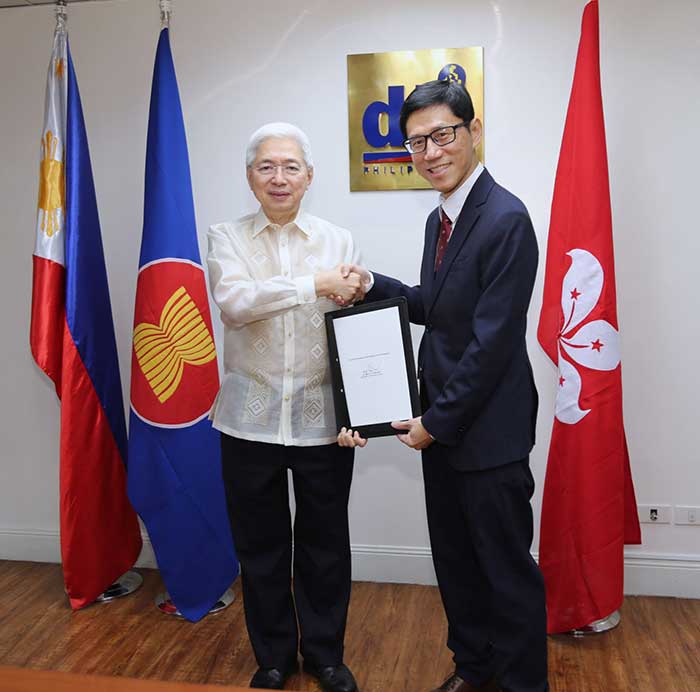On 14 February 2024, Department of Trade and Industry (DTI) Secretary Fred Pascual signed two key economic instruments to enhance the Philippines’ free trade agreement (FTA) network.
These are the ASEAN-Australia-New Zealand FTA (AANZFTA) and the ASEAN-Hong Kong, China FTA (AHKFTA).
Ambassador Hae Kyong Yu of Australia, Ambassador Peter Kell of New Zealand, and Acting Director-General Allan Pang of the Hong Kong Economic & Trade Office (HKETO) in Jakarta witnessed the signing.
Strengthening AANZFTA relations
The Second Protocol updates the original AANZFTA and First Protocol signed in February 2009 and August 2014, respectively. The new provisions respond to the evolving multidimensional challenges in the business environment and aim to maintain the agreement as a relevant, high-quality FTA and complement the region-to-region efforts to strengthen supply chain resilience, inclusivity, and sustainable development.
“The finalization of the Second Protocol to Amend the AANZFTA represents another milestone in our work to further strengthen regional trade and investment flows between ASEAN, Australia, and New Zealand. We want to ensure the agreement continues to benefit businesses and reinforce our strategic links in the region,” said Secretary Pascual.
The improved commitments under the agreement included new chapters on government procurement, trade and sustainable development, and micro, small, and medium enterprises (MSMEs).
Further, there are new rules to boost merchandise trade under the Chapter on Trade in Goods and Customs Procedure, such as facilitating trade of essential goods during humanitarian crises and addressing related issues on non-tariff measures.
Boosting PH services, investments, and cooperation
Market access commitments under the amended AANZFTA Chapter on Trade in Services will provide greater stability for Filipino businesses interested in investing and providing services in Australia and New Zealand. These include sectors such as professional services, education, transportation, construction, tourism, and banking services, among others.
Other key provisions under the Second Protocol are the Professional Services and Education Services Cooperation annexes, which provide a framework for relevant authorities to negotiate initiatives on the mutual recognition of professional qualifications, licensing, or registration in professional services sectors or bilateral or regional cooperation.
These provisions will allow recognition of educational qualifications, digital education, blended learning, and other diverse forms of education delivery. They will further assist Filipino professionals in practicing their profession in Australia and New Zealand.
Moreover, this new commitment complements the country’s implementation of the Transnational Higher Education Act (TNHE) or Republic Act 11448, passed in 2019, allowing foreign universities to provide education services through partnering with a local institution.
There are also enhanced provisions to promote electronic payments in the region, competition rules to lower barriers, and consumer protection to ensure fair trade practices.
“The DTI committed to spreading awareness and maximizing the benefits of AANZFTA for Philippine businesses, including MSMEs. Our goal is to foster resilience and sustainability for the long term, facilitating the flow of goods and services, and attracting investments. I am confident this agreement will contribute to a stable and predictable trade and investment regime as well as greater movement of skilled professionals in the region,” said the DTI chief.
“The DTI conducts outreach activities to assist stakeholders make the most of our free trade agreements,” he added.
Requirements to export under the AHKFTA improved
Under the First Protocol to Amend the AHKFTA, Parties adopted more liberal rules of origin for manufacturing products such as food preparations, polystyrene, jewelry, woven fabrics, and denim. Simpler rules will allow traders to claim the lower tariffs in the agreement.
“We welcome signing the AHKFTA First Protocol to boost trade through simplified export requirements between ASEAN and Hong Kong. We recognize the developments in the global economy and the challenges that come with it. It is also important that ASEAN and Hong Kong optimize their economic partnership anchored on a rule-based system,” the DTI Secretary underscored. Secretary Pascual said the Department encourages “implementing cooperation initiatives through the economic and technical cooperation components of the AHKFTA, which include those intended to enhance logistics system and trade facilitation procedures, promote the utilization of digital technology, broaden the global market reach of MSMEs, and strengthen the business networks to facilitate more investments using the AHKFTA.”






















